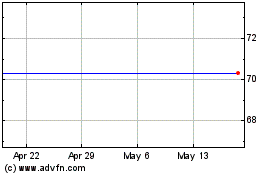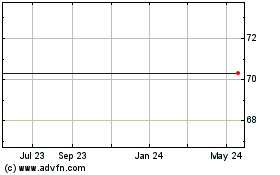Express Scripts Inc. (ESRX) agreed to buy Medco Health Solutions
Inc. (MHS) for $29.1 billion in cash and stock, linking together
two of the nation's largest pharmacy-benefit managers at a time one
of them faces losing its biggest customer.
By joining forces, Express Scripts and Medco will become the
largest PBM with nearly a third of the market. They aim to leverage
their new-found heft to lower the cost of prescription
drugs--indicating more pressure on pharmaceutical companies at a
time they're already facing the loss of patent protection for top
products.
"The cost and quality of healthcare is a great concern to all
Americans; this is the right deal at the right time for the right
reasons," said Express Scripts Chief Executive George Paz, 55 years
old, who will lead the combined company. PBMs help employers and
health-insurance companies administer prescription-drug benefits,
process claims and control drug costs by securing discounts from
drug makers.
Medco--larger than Express Scripts by revenue but smaller by
market capitalization--also confirmed its deal with managed-care
giant UnitedHealth Group Inc. (UNH) won't be renewed when the
current contract expires after next year. UnitedHealth, which
represents 17% of Medco's sales, is expected to run that business
itself.
Medco holders will receive $28.80 in cash and 0.81 Express
Scripts shares for each share, valuing Medco at $71.36, a 28%
premium to Wednesday's close. In premarket trading Thursday, Medco
continued to trade below the offer price. The deal--based on ESRX
trading at $56.25, up 7%--values MHS at $74.36 a share. MHS shares
are trading at $66.75, up 20%.
After the deal closes, Express Scripts shareholders are expected
to own about 59% of the combined company, and Medco shareholders
will have the remainder. The combined company will be headquartered
in St. Louis, where Express Scripts is now.
The companies expect the deal to create $1 billion in synergies
and close by first half of 2012, although it could face antitrust
scrutiny.
The regulatory review "may be challenging," Sanford Bernstein
analyst Helene Wolk said, but the industry's competitive intensity,
plus the emergence of UnitedHealth's business, "improve the
likelihood of approval." CVS Caremark Corp. (CVS) is the other
major pharmacy-benefit manager and has about 21% of the market,
Wolk said.
In their merger press release, the companies emphasized that the
deal would help lower drug costs and create a more efficient
healthcare system, possibly an indication of their argument against
the antitrust concerns.
Medco has faced intense speculation for the past couple months
that UnitedHealth could end its relationship with Medco in favor of
its own internal pharmacy-benefit manager, known as OptumRx.
UnitedHealth didn't have a decision to announce on its earnings
call Tuesday, though Chief Executive Stephen Hemsley said the
company continued to assess its options and opportunities.
But Medco confirmed Thursday that "after several months of
discussions, its pharmacy benefit services agreement with
UnitedHealthcare would not be renewed." Medco will continue serving
the health insurer through the expiration of the current agreement
at the end of next year.
While the catalyst for the Express Scripts/Medco deal is
"ultimately offensive," it's "initially defensive," Barclays
analyst Larry Marsh said. He noted Medco's UnitedHealth loss plus
Express Scripts "weaker-than-expected scripts" for the second
quarter.
There has already been consolidation in the pharmacy-benefit
management industry. Express Scripts officials have publicly said
in the last year that the company was on the hunt for acquisitions.
In 2009, it acquired the prescription unit of WellPoint Inc. (WLP),
a health insurer, in a $4.7 billion deal.
In 2007, Express Scripts lost out on acquiring rival Caremark Rx
to drug store giant CVS, which acquired Caremark for about $26
billion. At that time, Medco was seen as a possible next target for
Express Scripts. Express Scripts, which employs about 13,000
people, also distributes injectible biopharmaceutical products to
patients or doctors, and provides cost-management and patient-care
services.
Medco, spun out of drug giant Merck & Co. in 2003, provides
clinical research and pharmacy services aimed at improving care
while reducing health-care costs for private and public employers,
union and government agencies. The company took in $66 billion in
2010 net revenue.
Express Scripts reported its second-quarter earnings climbed 15%
to $334.2 million, or 66 cents a share. Excluding items, per-share
earnings were 71 cents. Revenue edged up 0.6% to $11.36
billion.
Meanwhile, Medco reported its earnings fell 4% to $342.8
million, or 85 cents a share. Excluding writedowns, per-share
earnings rose to 96 cents from 87 cents. Revenue jumped 4.1% to
$17.07 billion.
The advisers for Express Scripts are Credit Suisse Group AG
(CS), Citigroup Inc. (C) and law firm Skadden, Arps, Slate, Meagher
& Flom, LLP. Medco is advised by J.P. Morgan Chase & Co.
(JPM), Lazard Ltd. (LAZ), and law firms Sullivan & Cromwell LLP
and Dechert LLP.
This deal is the second-largest announced this year, after
AT&T Inc.'s (T) planned purchase of T-Mobile USA from Deutsche
Telekom AG (DTEGY, DTE.XE).
-By Jon Kamp, Dow Jones Newswires; 617-654-6728;
jon.kamp@dowjones.com
--Anupreeta Das, Gina Chon, Anna Wilde Mathews, Nathalie Tadena
and Lauren Pollock contributed to this story.
Medco (NYSE:MHS)
Historical Stock Chart
From Jun 2024 to Jul 2024

Medco (NYSE:MHS)
Historical Stock Chart
From Jul 2023 to Jul 2024
